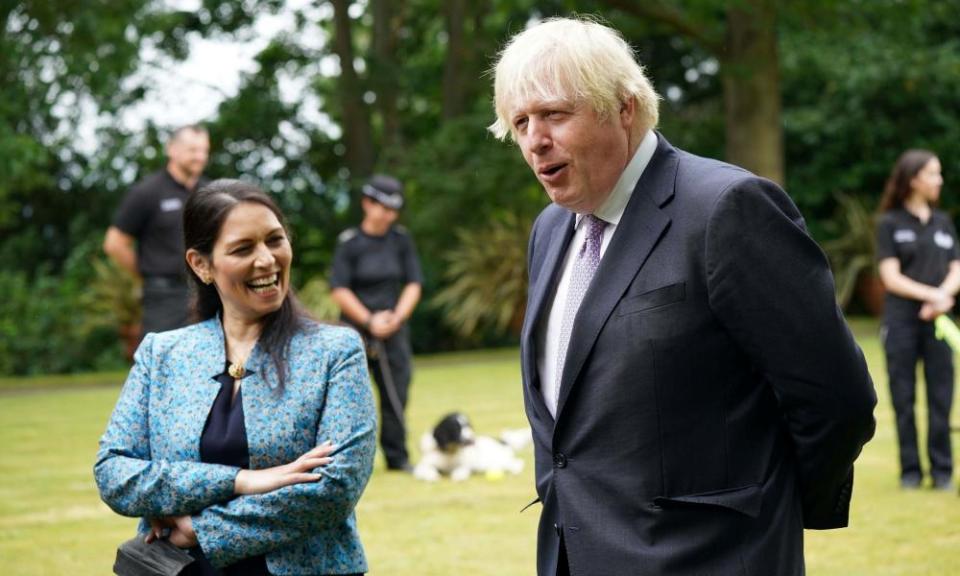Tories hope ‘crime week’ heralds return to old politics after Covid

Parliament is especially ghostly for summer recess this year as exhausted MPs flee back to their constituencies. But there is a hopeful atmosphere in the air from both parties, where MPs are starting to muse that the break may usher in the return to the kind of politics they are more comfortable with – the economy, crime, education and “levelling up”.
Polling between the parties has started to narrow – though Labour and Conservative strategists tend to see this as a return to normal service. The artificial inflation of a “vaccine bounce” – which No 10 never thought would hold – has died away.
This week, Survation found the Tories dropped from an 11 point lead to a two point lead in a fortnight and YouGov from a 13 point lead to a four point lead in five days.
Some Tory MPs said they believed that a more normal polling pattern would allow the party to see a more realistic picture.
“The economy is going to make a comeback,” one confidently predicted. While some of his colleagues fear a resurgence of the virus and the reimposition of restrictions will unleash a torrent of public anger, most believe rightly or wrongly that the worst is over – and want to get on with talking about other things.
“We are desperate to have something to talk about,” another Tory MP said. “I’ve got to have something to put on my leaflets that we’ve delivered on, and at the moment there is nothing to say. That’s OK when you can just say ‘the government is literally paying your wages’ but when that ends we need to start delivering fast.”
Boris Johnson has long been desperate to move on to talking about his government’s post-Covid agenda. But now the moment is approaching, his colleagues have started to fear there is too little to say.
The prime minister’s levelling up speech – described as a “landmark moment” – had some stirring rhetoric but little policy.
Indeed, there are several policies the government is pursuing that could even compound regional disparities.
The chancellor, Rishi Sunak, is understood to be uncomfortable with a Dilnot-style social care cap – because £50k is significantly more daunting if you live in a £150k home in the north of England versus a £650k in the south. A national insurance rise to pay for it would hit younger and lower-paid workers, as well as businesses, those most affected by the pandemic.
In his March budget, there are plans for £4bn of cuts to public spending that are likely to fall on councils, no matter how many times Johnson says austerity is nothing to do with him. Tories are also warning that Johnson’s net zero strategy is likely to disproportionately hit the voters who can least afford new cars and boilers.
The long-delayed social care plan appears to be at a stalemate after a pushback from cabinet ministers on the manifesto-breaking tax rise.
Instead, ministers are focusing on “crime week” – an issue which repeatedly comes up in focus groups as a growing concern. They have launched a plan which has been branded a rehash of old policies, expanding stop and search powers and piloting some alcohol tags, and gimmicks, like a named officer for a neighbourhood and league tables for 999 call handling.
Labour has seized on crime as an area of Conservative weakness – underlining shocking statistics on rape convictions, knife crime and antisocial behaviour. Keir Starmer, as a former director of public prosecutions, can helm that convincingly.
Labour sources suggest that doubts about the PM’s capacity to deliver are starting to show in focus groups. Voters in the north of England, especially those who switched in 2019, want to give Johnson a chance and give him the benefit of the doubt on Covid, but want to see spending start in their areas. In the south, Labour says they are noticing a dislocation, a sense that the party is ignoring their concerns and fuelling culture wars.
“One rule for them” is also a damaging trope, though real public anger is still mostly fuelled by personal pandemic breaches like Johnson attempting to dodge quarantine or Matt Hancock’s affair, rather than PPE contracts.
Across the board, there is a frustration with politicians talking in banalities – something Starmer himself has been guilty of – but Labour has Johnson’s levelling up speech as a key moment to point towards which was all mouth and trousers.
There are bear traps for the government along the path towards the end of the year too, battles with the Treasury over tax and spend, the threat of industrial action from medics and a mutinous Tory party prepared to vote down vaccine certification.
Many veteran Tories hope that Johnson can refocus on the Tory party’s strengths – his own authenticity and growing the economy, where voters still do not trust Labour.
Labour has its own internal battles to play out over the economy, between shadow cabinet ministers like Ed Miliband who think the party should “go big” and make a radical economic offer to voters to heal post-pandemic scars, and those like the former shadow chancellor turned shadow cabinet office minister Anneliese Dodds, who warn voters still believe Labour will bankrupt the nation.
Overall, though Tories gripe, none are seriously starting to panic. One Conservative strategist said voters still saw Labour as riven with internal division and thought Starmer had failed to make an impression, whereas Johnson was thought authentic and personable.
They compared the images of the two leaders watching the football, where Johnson, who barely knew the rules, looked more at ease than Starmer, a passionate and knowledgable fan with a season ticket at Arsenal.
One Tory strategist jokes: “Everything we do is reactive and driven by focus groups with no strategy – but the saving grace is that Labour are doing exactly the same.”

 Yahoo News
Yahoo News 